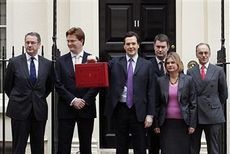 Lord Lawson has given George Osborne’s Budget an A-minus. Writing in today’s Times (£), the former chancellor said that his successor ‘got the big questions right’ by sticking to deficit reduction and assisting hard-pressed taxpayers where he could. The only blemish was the carbon price floor for the energy sector, which Lawson describes as ‘nothing less than an anti-growth strategy’.
Lord Lawson has given George Osborne’s Budget an A-minus. Writing in today’s Times (£), the former chancellor said that his successor ‘got the big questions right’ by sticking to deficit reduction and assisting hard-pressed taxpayers where he could. The only blemish was the carbon price floor for the energy sector, which Lawson describes as ‘nothing less than an anti-growth strategy’.
Also, Lawson warns Osborne against uniting income tax and national insurance. Unsurprisingly, Mrs Thatcher’s great reforming chancellor looked into this measure and is convinced that it is a non-starter.
‘This superficially attractive reform, which is by no means a new idea, was known in the Treasury in my time as NICIT. I had, indeed, planned a major move towards NICIT in my 1988 Budget, and instituted in 1987 the most thorough study by Treasury and Inland Revenue officials there had been (it had been looked at, less thoroughly, in 1982). As the study developed, it became increasingly clear that what looked at first sight so elegant and logical was in practice a huge elephant trap, and in January 1988 I aborted the project. So I say to George: “Don’t go there”. In fact, I suspect he is already backtracking. His Budget speech was reassuringly careful, ruling out the application of national insurance contributions (unlike income tax) to pensions or savings income and (although describing it as a “historic step”) seeming to commit himself to little more than tidying up administration of the two systems, which may be very sensible but is scarcely “historic”. The problems in a merger are many, quite apart from the pensions point — among them that numerous allowances and reliefs apply to income tax, which do not apply to national insurance contributions. A merger of the two would, in practice, be very costly and (because there would be both winners and losers) highly unpopular, all to little advantage. None of the officials who worked on the 1987 study are there now. But the Chancellor would do well to dust down the NICIT dossier (and also the associated upper earnings limit dossier), and to read, mark, learn and inwardly digest it. I do not want to see him fall into the elephant trap.’






Comments